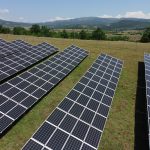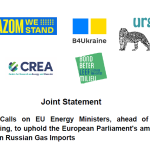Today the European Commission has revealed the first act of the European Green Deal, the Just Transition Mechanism, a funding scheme set to address the investment needs of Europe’s regions in their move to net-zero greenhouse gas emissions.
This should provide new impetus for drastic emissions cuts in the short term.
The Just Transition Mechanism is part of today’s proposal ‘Sustainable Europe Investment Plan’, the financing arm of the von der Leyen Commission’s European Green Deal. It will help EU’s regions, particularly the most carbon-intensive ones, speed up the transition away from fossil fuels while ensuring no-one is left behind.
The plan to dedicate 100 billion euros to the just and clean energy transition in the regions should pave the way for an agreement on a substantially increased 2030 climate target before the EU-China leaders summit in September, to build momentum ahead of the international deadline by which all countries must submit new targets, latest by COP 26 in November of this year.
This funding scheme will benefit the EU countries that set out territorial transition plans to achieve net-zero emissions, and describe in detail all the steps needed.
However, the transition plans do not require the exclusion of investments in fossil fuels, gas in particular while this would undermine the net-zero emissions goal. The proposal also omits to hold polluters into account by allowing countries to pay off coal plants for their early closures.
This European Commission’s proposal is tabled while the overall negotiations on the EU’s long-term budget are entering their final stage. Beyond the proposed new funding, all the EU budget could deliver rapid emissions cuts, by excluding fossil fuels from funding possibilities and dedicating 40% of its spending to climate action. And the entire EU funding for regional development – Cohesion Policy – has potential in equipping the most polluted regions with clean infrastructure.
Reacting to the Just Transition Mechanism proposal, Wendel Trio, Director of Climate Action Network (CAN) Europe said:
“With this financial support to spur climate action across Europe’s regions, the EU shows it can put the money where its mouth is. The lack of financial means can no longer be used as an excuse for not committing to increase climate ambition. On the contrary, this fund should pave the way for raising the EU 2030 climate target to 65% emissions cuts in line with the Paris Agreement. And it must go hand-in-hand with a climate-friendly EU budget for the next decade that stops subsidizing fossil fuels and invests a lot more in climate action than today.”
“The Just Transition funding can only benefit the Member States that have embraced the carbon neutrality goal in their energy and climate plans. To become eligible, many of them have to improve their copy.”
ENDS
Contact:
Nicolas Derobert, CAN Europe Communications Coordinator, nicolas@caneurope.org, +32 483 62 18 88
Notes to editors:
* The Just Transition Mechanism is composed of three pillars:
- A Just Transition Fund established under the current Cohesion Policy framework staffed with 7.5 billion euros additional to current EU budget commitments, and reaching an overall financing capacity of 30-50 billion euros including other Cohesion Policy resources and national co-financing;
- A dedicated investment scheme under the EU budget’s InvestEU (Former Juncker plan);
- A new public loan facility in the European Investment Bank.
* The communication is accessible here.
Climate Action Network (CAN) Europe is Europe’s leading NGO coalition fighting dangerous climate change. With over 160 member organisations from 35 European countries, representing over 1.700 NGOs and more than 47 million citizens, CAN Europe promotes sustainable climate, energy and development policies throughout Europe.



